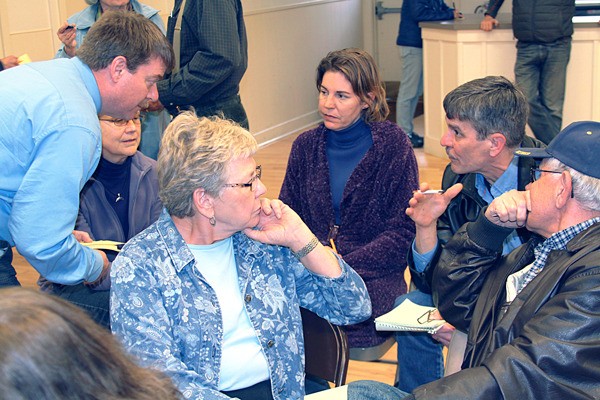It’s a good thing sticky notes were in abundant supply at the Coupeville Recreation Hall on Monday night.
Opponents of a proposal to develop parts of Joseph Whidbey State Park for private business put the notes to good use, providing a tall stack of reasons why they think the concept is a bad idea.
About 80 people came to the public meeting to voice their concerns to Washington State Parks staff, which scheduled the event to gather input over the controversial proposal to allow privately financed recreational developments at Joseph Whidbey State Park.
Joseph Whidbey State Park in Oak Harbor is one of 10 state parks under consideration for such a plan and the only one in Island County.
The Washington Parks and Recreation Commission adopted a strategy two years ago to expand the use of parks land holdings to try to generate more revenue for the state’s struggling parks system.
Joseph Whidbey State Park landed on the initial list of candidate sites that was revealed publicly in January, causing a tidal wave of concern for those who freqently visit the beachfront park on Whidbey Island’s west side.
Under the proposal, 60 of the 206 total acres at Joseph Whidbey State Park could be used for possible development that could include up to 50 cabins, a lodge-type structure with food services and new day-use facilities as well as dry boat storage. Consultants hired by State Parks came up with the proposal.
Those in attendance Monday night called the plan a bad fit for Joseph Whidbey State Park, pointing to its small size in relation to other state parks, its potential impact on wildlife and their habitat, including a pair of nesting bald eagles, and its close proximity to nearby residents as well as a Navy shooting range.
Their concerns were randomly expressed vocally and more formally in writing after State Parks planner Nikki Fields asked for those in attendance to break into small groups and write down their thoughts to be read aloud.
The meeting didn’t go quite as some expected, including Rick Hannold, Island County commissioner.
“It was advertised as a meeting to take public comment,” Hannold said. “I was a tad bit disappointed because I had my hand up for about five minutes straight and never had an opportunity to speak. I had questions I wanted to ask that were better verbalized than putting a sticky paper on the wall.”
The points of emphasis during the writing exercise centered around Recreation Business Activities, or RBAs, the term used for private recreation developments designed to provide amenities for park visitors. State Parks also asked for input on the State Parks’ real estate policy revision approved by the Commission last year that changed land classifications on state parks land to open the door to RBAs.
The public also shared concerns on any other issues associated with the proposal.
The wall was covered with at least 75 sticky notes.
None endorsed the idea.
“I’m writing ‘terrible, terrible’ on everyone of my notes … because the whole thing is terrible,” said Dianna Deseck Piazzon, a retired school teacher from Coupeville.
“I don’t care if they call it Recreational Business Activities, it’s privatizing our parks. There’s got to be some better way to increase our park revenue. Maybe we have to close the parks for a year or two and get our legislators to get on board and pass some taxes.”
“There has to be a better way.”
The crowd also raised concerns over potential logging, increased traffic and other potential environmental impacts.
State Parks staff was asked whether it was following the proper environmental review and necessary timeline required under the State Environmental Policy Act, or SEPA.
The staff will type up all the public’s notes scribbled down during Monday night’s exercise and furnish them for the State Parks Commission to review before approving the first round of candidate sites at its meeting May 19 in Moses Lake.
Public comment will still be accepted online in time for review on the State Parks website through March 27.
Parks staff hopes to have its own recommendation for the commission by the end of April.
Rodger Schmitt, one of seven members on the commission, attended Monday night’s meeting and listened for himself the public reaction from Whidbey residents.
It was resoundly opposed.
“It was not really unexpected,” said Peter Herzog, assistant director of parks development.
“I just don’t want to see it commercialized,” Coupeville resident Jill Hein said, echoing a popular sentiment.
Jon Crimmins, area manager for Central Whidbey State Parks, also attended the meeting and answered various questions. Joseph Whidbey is one of the state parks he oversees.
He said residents’ passion for the park was clear.
“I was really excited to see so many people show up,” Crimmins said.
To provide public comment on private development consideration at Joseph Whidbey State Park, go to http://parks.state.wa.us/900/Real-Estate-Policy-Update



